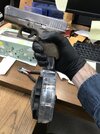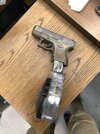If it were the same two cops doing the dusting for prints on the brass that did the dusting in my home after a breakin some years ago, I would say no. Everything was taken from one room. That's the one room where they did absolutely no dusting. Nor did they look for prints on the back door. Breaking the back door is how they got in. They did dust in one room. That's the one room in the house where nothing was disturbed. They did find ""ONE"" print in that room. ""One"". We lived in that house 14 years and used that room every day. Us, our kids, our grandkids and others. ""ONE"" print in that entire room??? We don't clean house that good. The cops asked us if we wanted them to dust for prints. The look on his face when we said "yes". It took us 3 days of scrubbing that carpet trying to get ""Some"" of the dust out. It's now over 10 years later and you can still see it.
Never heard from the cops again. Not one word.
Advice, A cheap pistol was taken that I got from my dad. A cheap little gun that was worth nothing so I never bothered to record the serial number. I only had it a couple weeks.
If you don't keep a record of the serial number and it's stolen, Even if it's found. You will not get it back.




